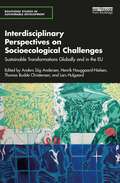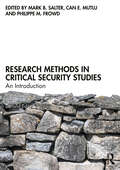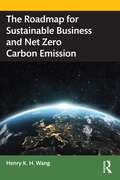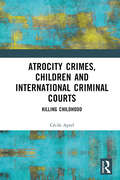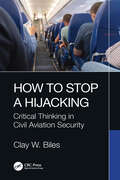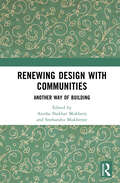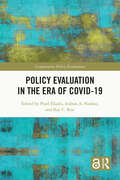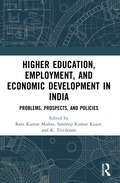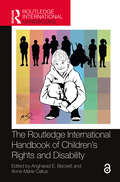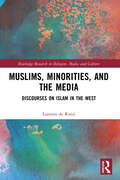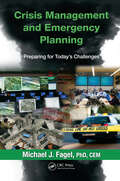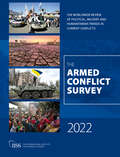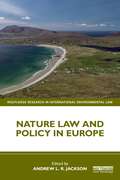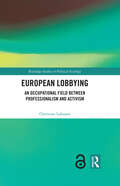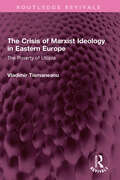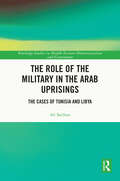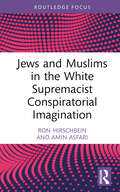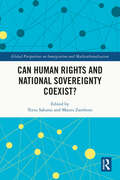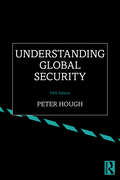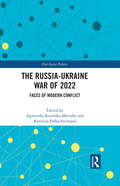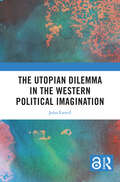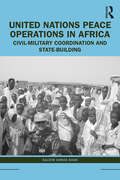- Table View
- List View
Interdisciplinary Perspectives on Socioecological Challenges: Sustainable Transformations Globally and in the EU (Routledge Studies in Sustainable Development)
by Anders Siig Andersen Henrik Hauggaard-Nielsen Thomas Budde Christensen Lars HulgaardThis book explores interdisciplinary perspectives on socioecological challenges and offers innovative solutions at both a European and global level. This book critically reflects on the latest scientific knowledge regarding the increasing instability of the Earth System caused by human activities during the Anthropocene and the Great Acceleration. It focuses on the global and European challenges regarding climate, resources, bio-integrity, and environment. The authors assess the obstacles to overcoming these challenges and examine the risks posed by path dependencies, lock-ins, and trade-offs between global and regional goals. They also drill down into the complexities of the European Green Deal, specifically the similarities and differences between the scientific analyses and recommendations from the European Environment Agency and the content of the Deal. Finally, the book looks at the Just Transition put forward by the European Green Deal. The authors discuss this in a context of global and European ecological and socioecological challenges and put the question of equality, recognition, and democratization at the center. Outlining new pathways to broaden the scope of scientific collaboration between the natural and technical sciences and the social sciences and the humanities, this volume will be of great interest to students and scholars of sustainable development, environmental policy and governance, and environmental justice.
The Rise and Decline of Modern Democracy (Routledge Studies in Global and Transnational Politics)
by Damien KingsburyThe Rise and Decline of Modern Democracy assesses the rise of, subsequent political challenges to, and decline of, contemporary liberal democratic processes, in particular since the ‘third wave’ of democratization from the 1990s. Democracy is in global decline. Fewer countries are democratic and fewer people, globally, live in substantive democracies. Autocracy is now the dominant political form and the future looks, at best, challenging for the retention of such democracies that remain. As they did a century ago, nationalism and populism have again reared their ugly heads, and more people are claiming that democracy no longer addresses their most compelling needs or interests. This book examines what democracy is and the circumstances that allowed – even encouraged – it to arise. Democracy has been a product of a need to find a political model that mediates between competing interests, building on conducive conditions. However, there have since been fundamental changes to those conditions, imbalances within democratic countries and between countries, that have diminished the strength of the democratic proposition. The question now arises as to whether democracy can continue as a matter of political will. Challengers to democracy, from the radical Right in developed countries to populist autocracy and state-centred authoritarianism in developing countries, have increasingly shown this may not be the case. Democracy may survive, as this book concludes, but is likely to do so only with more substantial and conscious commitment to the democratic project, with recognition of the need to replenish the fertility of the political soil in which democracy grows. This wide-ranging and empirically and theoretically rich book will be of interest to students, scholars and researchers of political science, international relations, history and democracy.
Research Methods in Critical Security Studies: An Introduction
by Mark B. Salter, Can E. Mutlu and Philippe M. FrowdThis textbook surveys new and emergent methods for doing research in critical security studies, filling a gap in the literature. The second edition has been revised and updated. This textbook is a practical guide to research design in this increasingly established field. Arguing for serious attention to questions of research design and method, the book develops accessible scholarly overviews of key methods used across critical security studies, such as ethnography, discourse analysis, materiality, and corporeal methods. It draws on prominent examples of each method’s objects of analysis, relevant data, and forms of data collection. The book’s defining feature is the collection of diverse accounts of research design from scholars working within each method, each of which is a clear and honest recounting of a specific project’s design and development. This second edition is extensively revised and expanded. Its 33 contributors reflect the sheer diversity of critical security studies today, representing various career stages, scholarly interests, and identities. This book is systematic in its approach to research design but keeps a reflexive and pluralist approach to the question of methods and how they can be used. The second edition has a new forward-looking conclusion examining future research trends and challenges for the field. This book will be essential reading for upper-level students and researchers in the field of critical security studies, and of much interest to students in International Relations and across the social sciences.
The Roadmap for Sustainable Business and Net Zero Carbon Emission
by Henry K. WangWhat does sustainable business and net zero carbon emission mean for businesses globally? How should companies globally transform into sustainable businesses with net zero carbon emissions? This book unpacks the institutional, organisational and management challenges in pursuing sustainable business and carbon neutrality for businesses. In this book, Henry K. H. Wang, an internationally recognised Climate and Business expert, provides real-life cases across different countries and business sectors. He outlines potential policy implications and strategy options for companies to consider in their transitions to sustainable business practices. He also explores important new global developments in smart cities, green transport and carbon solutions, and how the adoption of sustainable finance and green investments can accelerate businesses transformation. This book will appeal to anyone interested to learn more about the successful planning and execution of sustainable business and net zero carbon neutrality transformations.
Atrocity Crimes, Children and International Criminal Courts: Killing Childhood
by Cécile AptelThis book shows how international criminal courts have paid only limited and inconsistent attention to atrocity crimes affecting children. It elucidates the many structural, legal, financial and even attitudinal obstacles, often overlapping, that have contributed to the international courts’ focus on the experience of adults, rendering children almost invisible. It reviews whether and how different international and hybrid criminal jurisdictions have considered international crimes committed against or by children. The book also considers how international criminal justice can help contribute to the recognition of the specific impact that international crimes have on children, whether as victims or as participants, and strengthen their protection. Finally, it proposes an agenda to improve this situation, making specific recommendations encompassing the urgent need to further elaborate child-friendly procedures. It also calls for international investigative and prosecutorial strategies to be less adult-centric and broaden the scope of crimes against children beyond the focus on child-soldiers. This book is an invaluable resource for academics, researchers and fieldworkers in the areas of international criminal law, international human rights law/child rights, international humanitarian law, child protection and transitional justice.
How to Stop a Hijacking: Critical Thinking in Civil Aviation Security
by Clay W. BilesHijackings and bombings have plagued civil aviation since 1930 and air rage incidents are on the rise. While there is aircraft and inflight training available for air marshals, other first responders receive minimal training on inflight security awareness and protocols. There are no other resources currently available to flight crews or armed first responders that specifically address inflight security and how to address threats of disturbances on airplanes.How to Stop a Hijacking provides readers with fundamental principles on how to think more critically about onboard security threats. The aircraft cabin poses unique environment and security challenges, and first responders can apply security awareness and critical thinking skills to establish a safer environment in the cabin and airport for everyone onboard. The lessons in this book are driven with the central objective of teaching the reader how to counter inflight aggression and maintain tactical control of the cabin. Written by a former federal air marshal instructor, this book looks at the recent rash of air rage incidents and violence on airplanes, in addition to the real and ever-present threat of hijack or potential explosive device.How to Stop a Hijacking is a practical guide that offers methodological and tactically proven strategies for stopping violent acts onboard an aircraft inflight.
How to Stop a Hijacking: Critical Thinking in Civil Aviation Security
by Clay W. BilesHijackings and bombings have plagued civil aviation since 1930 and air rage incidents are on the rise. While there is aircraft and inflight training available for air marshals, other first responders receive minimal training on inflight security awareness and protocols. There are no other resources currently available to flight crews or armed first responders that specifically address inflight security and how to address threats of disturbances on airplanes. How to Stop a Hijacking provides readers with fundamental principles on how to think more critically about onboard security threats. The aircraft cabin poses unique environment and security challenges, and first responders can apply security awareness and critical thinking skills to establish a safer environment in the cabin and airport for everyone onboard. The lessons in this book are driven with the central objective of teaching the reader how to counter inflight aggression and maintain tactical control of the cabin. Written by a former federal air marshal instructor, this book looks at the recent rash of air rage incidents and violence on airplanes, in addition to the real and ever-present threat of hijack or potential explosive device. How to Stop a Hijacking is a practical guide that offers methodological and tactically proven strategies for stopping violent acts onboard an aircraft inflight.
Renewing Design with Communities: Another Way of Building
by Anisha Shekhar Mukherji and Snehanshu MukherjeeThis book looks at alternative ways of analyzing traditional and contemporary architectural design and building practices in South Asia with a special focus on India. It showcases how collaborative projects between architects and local communities and drawing from local building traditions can lead to sustainable and equitable practices in architecture. The volume includes an analysis of projects in rural, tribal, and urban areas of India and Nepal and first-hand accounts of architects, teachers, and professionals engaged in the theory and practice of design and architecture. It examines the differences between the individualistic and the collective approach and explores the meaning of architecture as a process and as a product and as a decentralized, ecologically, and locally sensitive way of designing. While comparing traditional and modern methods of building, it also examines the impact of each method on the community, the economy and the surrounding environment. This book will be of interest to researchers and students of architecture, urban studies, urban planning, urban ecology, urban geography, and sustainable development. It will also be useful for architects, planners, urban designers, and professionals associated with these disciplines.
Policy Evaluation in the Era of COVID-19 (Comparative Policy Evaluation)
by Pearl Eliadis Indran A. Naidoo Ray C. RistDid evaluation meet the challenges of the COVID-19 crisis? How were evaluation practices, architectures, and values affected? Policy Evaluation in the Era of COVID-19 is the first to offer a broad canvas that explores government responses and ideas to tackle the challenges that evaluation practice faces in preparing for the next global crisis. Practitioners and established academic experts in the field of policy evaluation present a sophisticated synthesis of institutional, national, and disciplinary perspectives, with insights drawn from developments in Australia, Canada and the UK, as well as the UN. Contributors examine the impacts of evaluation on socioeconomic recovery planning, government innovations in pivoting internal operations to address the crisis, and the role of parliamentary and audit institutions during the pandemic. Chapters also example the Sustainable Development Goals, and the inadequacy of human rights-based approaches in evaluation, while examining the imperative proposed by some authors that it is time that we take seriously the call for substantial transformation. Written in a clear and accessible style, Policy Evaluation in the Era of COVID-19 offers a much-needed insight on the role evaluation played during this unique and critical juncture in history.
Higher Education, Employment, and Economic Development in India: Problems, Prospects, and Policies
by Ram Kumar Mishra, Sandeep Kumar Kujur, and K. TrivikramThis volume examines the role of higher education and employment in economic development in emerging economies like India. It looks at the contours of higher education policies and the labour market dynamics to explore ways to address joblessness and income disparity. The book discusses themes such as quality and access to higher education, the shift towards private investment in higher education, demographic dividend and joblessness among youth, social and income inequalities, labour migration and employment, and the participation of women in the workforce, among others. It provides insights into the challenges relating to employment generation in the industrial sector. It also offers solutions and policy measures to move towards sustainable growth, better employment opportunities in various sectors of industries, and human development. Rich in empirical data, this volume will be of interest to students and researchers of education, economics, development studies, sociology, gender studies, and social and economic policy.
The Routledge International Handbook of Children's Rights and Disability (Routledge International Handbooks)
by Angharad E. Beckett Anne-Marie CallusThis handbook provides authoritative and cutting-edge analyses of various aspects of the rights and lives of disabled children around the world. Taking the UN Convention on the Rights of Persons with Disabilities (CRPD) and the UN Convention of the Rights of the Child (CRC) as conceptual frameworks, this work appraises the current state of affairs concerning the rights of disabled children across different stages of childhood, different life domains, and different socio-cultural contexts. The book is divided into four sections: Legislation and Policy Children’s Voice The Life Course in Childhood Life Domains in Childhood Comprised of 37 newly commissioned chapters featuring analyses of UN documents and case studies from Australia, Brazil, Ethiopia, Hong Kong, Italy, the Netherlands, Norway, Papua New Guinea, Serbia, South Africa, Spain, Sweden, the United Kingdom, the United States, and Vanuatu, its multidisciplinary approach reflects the complexities of the lives of disabled children and the multifarious nature of the strategies needed to ensure their rights are upheld. It will be of interest to researchers and students working in disability studies, education, allied health, law, philosophy, play studies, social policy, and the sociology of childhood. It will also be a valuable resource for professionals/practitioners, allowing them to consider future directions for ensuring that disabled children’s rights are realised and their well-being and dignity are assured.
Muslims, Minorities, and the Media: Discourses on Islam in the West (Routledge Research in Religion, Media and Culture)
by Laurens de RooijInspired by overtly negative coverage by the Western mainstream press of Muslims in particular, and minorities in general, this book asks: Why are negative narratives and depictions of Muslims and other minorities so hard to change? News reports about Islam and Muslims commonly relate stories that discuss terrorism, violence or other unwelcome or irrational behaviour, or the lack of integration and compatibility of Muslims and Islam with Western values and society. Yet there is little research done on how studies on media reports about minorities seemingly fail to improve the situation. Combining empirical research with a structural analysis of the media industry, this volume presents evidence for the maligned representation of minorities by media corporations, analysing why negative narratives persist and outlining how these can be effectively transformed. It is an outstanding resource for students and scholars of media, religion, culture, sociology, and Islamic studies, and is also of benefit for journalists, media representatives, and activists looking to effect change for minority representation in the media industry specifically or in society at large.
Crisis Management and Emergency Planning: Preparing for Today's Challenges
by Michael J. FagelEmergency managers and officials have seen a tremendous increase in the planning responsibilities placed on their shoulders over the last decade. Crisis Management and Emergency Planning: Preparing for Today's Challenges supplies time-tested insights to help communities and organizations become better prepared to cope with natural and manmade disas
Armed Conflict Survey 2022
by The International Institute for Strategic StudiesThe Armed Conflict Survey 2022 provides an exhaustive review of the political, military and humanitarian dimensions of 33 active armed conflicts globally in the period from 1 March 2021 to 30 April 2022. The review is complemented by a strategic analysis of national, regional and global drivers and conflict outlooks, providing unique insights into the geopolitical and geo-economic threads linking conflicts across the world, as well as into emerging flashpoints and political risks. This edition includes a special feature on climate security given the increasingly urgent need to understand the complex interlinkages between climate change, climate vulnerability and conflict amid accelerating global warming. Reflecting the growing importance of geopolitical factors in the current global conflict landscape, The Armed Conflict Survey 2022 features the IISS Armed Conflict Global Relevance Indicator, which compares the global relevance of armed conflicts in terms of their geopolitical impact, as well as their human impact and intensity. This edition also includes maps, infographics and key statistics, as well as the accompanying Chart of Armed Conflict.
Nature Law and Policy in Europe (Routledge Research in International Environmental Law)
by Andrew L. R. JacksonThis volume considers current and future challenges for nature law and policy in Europe. Following the Fitness Check evaluation of the Birds and Habitats Directives, in 2017 the EU adopted an Action Plan for nature, people and the economy to rapidly improve the Directives’ implementation and accelerate progress towards the EU's biodiversity targets for 2020. More recently, the EU has adopted a Biodiversity Strategy for 2030 and proposed an EU Nature Restoration Law. This book makes a timely contribution by examining the current state of play in light of recent and historical developments, as well as the post-2020 nature law and policy landscape. While evidence suggests that Natura 2000 and the Habitats and Birds Directives have delivered conservation benefits for wildlife in Europe, biodiversity loss continues apace. The book reviews the requirements for an effective international nature conservation system, with reference to the Birds and Habitats Directives. It examines regulatory regimes, current legal issues in the fields of site protection and species protection, the protection of areas outside Natura 2000, recent developments in the EU and the UK, including the implications of Brexit, agriculture and nature conservation, litigation, science and access to justice. Written by leading experts in the field, from a range of stakeholder groups, the volume draws on diverse experiences as well as providing interdisciplinary perspectives. This volume will be essential reading for students, scholars, practitioners, NGOs and policy-makers interested in European environmental policy and law, including for example lawyers, ecologists, environmental scientists, political scientists, natural resource managers, planners and civil servants.
Peace or Democracy?: Peacebuilding Dilemmas to Transition from Civil Wars
by Izabela Pereira WattsContrary to the common belief that peace and democracy go hand in hand after a civil war, Pereira Watts argues they are, in fact, at a crossroads. Offering an innovative framework based on Philosophical, Actors, and Tactical considerations, Pereira Watts identifies 14 dynamic dilemmas in democratic peacebuilding, with respective trade-offs. She focuses on explaining the contradictions in modern post-conflict recovery, the challenges facing interim governments, and the international community’s role. Based on an analysis of more than 40 countries between 1989 and 2022 and more than 60 UN peace operations, she presents critical issues that commonly need to be addressed in such scenarios: Elections and Political Parties; the Constitution; Checks, Balances and Power-sharing; Transitional Justice; Human Rights, Amnesty, Truth Commissions and War Crimes Tribunals; Disarmament, Demobilization, and Reintegration; and Media Reform and Civil Society. Solving any of these dilemmas leads to others that shape a complex apparatus for restoring peace and installing a new political regime. An essential resource for decision-takers, policymakers, international analysts and practitioners in the field of peacebuilding that will also be of great value to students of International Relations and Peace Studies as well as anyone interested in peacekeeping, democracy-building, and state-building.
European Lobbying: An Occupational Field between Professionalism and Activism (Routledge Studies in Political Sociology)
by Christian LahusenLobbying is an integral part of the political reality of the European Union and a highly competitive and dynamic field of interest groups. This book takes a systematic look at lobbyists in order to broaden our understanding of the staff entrusted with the responsibility of influencing European politics. Who are the European lobbyists? What are their professional backgrounds, career patterns, practices and beliefs? The study uses a sociological framework to explore the professionalisation and professionalism of the field across national proveniences, policy fields and interest groups, and develops a systematic analysis that considers three different dimensions: occupational patterns, shared knowledge and common convictions . Based on original research that combines in-depth interviews with survey data, European Lobbying demonstrates that European lobbying is a firmly established and highly professionalised métier. In an organisational field characterised by growth, pluralisation and increasing competition, the professional staff contributes to the homogenisation of European lobbying and the marginalisation of other, non-professionalised forms of interest representation. It will therefore appeal to scholars and students of sociology and politics with interest in European studies, EU politics and the sociology of the professions.
The Crisis of Marxist Ideology in Eastern Europe: The Poverty of Utopia (Routledge Revivals)
by Vladimir TismaneanuFirst published in 1988, The Crisis of Marxist Ideology in Eastern Europe states that since de-Stalinisation began in Eastern Europe, the ‘dead hand’ of institutional Marxism has been eroded by revisionist Marxism, with the turn to young Marx and the philosophy of human emancipation to undermine prevailing orthodoxies. But this revisionism clung to the old socialist dogmas and refused a total break with the system, and the effort eventually failed. The result was the emergence of a dissident counterculture rejecting the system entirely. Independent social movements (such as unofficial peace groups and trade unions like Solidarity) have given this counterculture a major role in Eastern Europe, whilst the ruling elites have responded with confusion. Tismaneanu concludes that the only hope for the anti-totalitarian intellectuals of Eastern Europe is to oppose the regimes with non-Marxist ideas – otherwise they will be permanently reduced to the status of a hopeless, albeit heroic minority. This book will be of interest to students of economics, political science and international relations.
The Role of the Military in the Arab Uprisings: The Cases of Tunisia and Libya (Routledge Studies in Middle Eastern Democratization and Government)
by Ali SarihanFocused on the 2010-2011 Arab Uprisings, this book examines the role of the military in Tunisia and Libya, arguing that both armies contributed decisively to the outcome and form of the respective uprisings. The book begins by contextualizing the uprisings, with both countries plagued by anti-democratic politics and unequal social and economic structures in the 2000s. Alongside this, the book explores the key actors and factors leading up to, during, and after the uprisings. Employing a comparative case study methodology and drawing from approaches in rational choice theory and institutionalism, the author argues that the tripartite configuration of energy capacity, military structure, and strength of protest led to dichotomous outcomes in the countries. Tunisia, where the military defected, was marked by a lack of energy wealth, apolitical military structure, and high level of protest, enabling a nonviolent transfer of power. In contrast, in Libya, where parts of the military remained loyal to Gaddafi’s regime, protests evolved into violent civil conflict. Making use of expert and elite interviews obtained from fieldwork in Tunisia, as well as data from the research field, the book will appeal to specialists and students interested in international politics, military and security studies, and the MENA region.
Jews and Muslims in the White Supremacist Conspiratorial Imagination (Conspiracy Theories)
by Ron Hirschbein Amin AsfariJews and Muslims in the White Supremacist Conspiratorial Imagination explores how Jews and Muslims are stigmatized and endangered by the same conspiratorial template. Supremacists imagine that Jews and Muslims secretly strive to replace white, European civilization with an unspeakable tyranny. The authors, a Jew and a Muslim, analyze the nature of the conspiracism that targets their communities. They historicize the supremacist conspiratorial imagination, narrating the paranoia on a continuum, from modernity to the postmodern. They begin with the texts of modernity, following them through to the dark areas of the Internet and examining their violent denouement in synagogues and mosques. The book investigates the classic text The Protocols of the Elders of Zion and neoclassic variations such as QAnon. It turns to Islamophobic responses to 9/11 such as paranoia regarding the Muslim Brotherhood and the doppelgänger of The Protocols, namely The Project. The authors conclude by questioning how "ordinary" people, prompted by paranoia and recognition hunger, resort to violence and murder. Admittedly, the authors are not certain—certainty is for conspiracists. But they may have a piece of the puzzle. This book will be of interest to students and scholars of conspiracy theories, antisemitism, Judeophobia, Islamophobia, political science, history, philosophy, psychology, sociology, and criminology.
Can Human Rights and National Sovereignty Coexist? (Global Perspectives on Immigration and Multiculturalisation)
by Tetsu Sakurai Mauro ZamboniLooking at two of the key paradigms of the post-Cold War era–national sovereignty, and human rights – this book examines the possibilities for their reconciliation from a global perspective. The real or imagined fear of a flood of immigrants has caused and fuelled the surge of an amalgam of populist political forces, anti-immigrant movements, and exclusionist nationalism in many developed countries. In the last decade, we have witnessed the emergence of two phenomena in the political and legal spheres. On the one hand, there are liberal globalists asking for respect and the protection of the basic human rights of migrants and asylum seekers and arguing for their civic and social integration into host societies. On the other hand, there are growing calls for a tougher stance on immigration, and powerful populist politicians and governments have emerged in many developed countries. How can the idea of universal human rights survive exclusionist nationalism that uses a populist, unscrupulous approach to its advantage? The contributors to this book explore the meaning of, and possible solutions to, this dilemma using a wide range of approaches and seek appropriate ways of dealing with these normative predicaments shared by many developed societies. Scholars and students of human rights, migration, nationalism and multiculturalism will find this a very valuable resource.
Understanding Global Security
by Peter HoughFully revised and updated, this fifth edition of Understanding Global Security considers the variety of ways in which peoples’ lives are threatened and / or secured in contemporary global politics. The traditional focus of security studies - war, deterrence and terrorism - are analyzed alongside non-military security issues such as famine, crime, disease, disasters, environmental degradation and human rights abuses to provide a comprehensive survey of how and why people are killed in the contemporary world. Key concepts of International Relations and globalization are defined and explained, prominent political thinkers and activists are profiled in short biographies and the human impact of the various security threats considered graphically illustrated in ‘top ten’ tables. Hence, this textbook introduces students to the full range of security issues in a clear and concise format that is easy to follow. Specific updates include: A refresh of the evolving theoretical literature on security including more analysis of feminist and post-colonial thought. Key recent international political developments- such as the Covid-19 pandemic, the war in Ukraine and the withdrawal of the US from Afghanistan - are appraised and incorporated. A new section on hybrid warfare is included in Chapter 2, misogynistic terror is profiled in Chapter 3, whilst gun-smuggling and cybercrime are considered in more depth in Chapter 10. Chapter 5 features analysis of the rise of ‘genocide diplomacy’. The rise of private legal challenges to governments for failing to implement commitments to the Paris 2015 Climate Change Accords is reviewed and analysed. Greater evaluation of global governance, in the face of populist nationalist challenges to international cooperation, is offered. User-friendly and easy to follow, this textbook is designed to make a complex subject accessible to all. Key features include: ‘Top ten tables’ highlighting the most destructive events or forms of death in those areas throughout history. Boxed descriptions elaborating key concepts in the fields of security and International Relations. ‘Biographical boxes’ of key individuals who have shaped security politics. Further reading and websites at the end of each chapter guiding you towards classic texts and the most up-to-date information on the various topics. Glossary of political terminology. This highly acclaimed and popular academic text will continue to be essential reading for everyone interested in security.
The Russia-Ukraine War of 2022: Faces of Modern Conflict (Post-Soviet Politics)
by Agnieszka Kasińska-Metryka Karolina Pałka-SuchojadThis volume examines the war in Ukraine from a range of historical, military and feminist perspectives, exploring aspects such as the attitude of neighboring states, political leadership, local government, social mechanisms and the cultural and media policies of both Russia and Ukraine. The contributors explain how Ukraine shaped its identity following its separation from the USSR and how Russia built its military power and implemented its invasion plans. Considering the impact of the war not only in Ukraine, but also the Baltic states, chapters discuss the leadership role of President Zelensky, patriotic attitudes, the victimization of women and the impact on Poland as it helps and aid to huge numbers of refugees. Providing much needed context on the Russia-Ukraine war, this book will be of interest to students and scholars of international relations, political science, gender studies, international and national security and public politics.
The Utopian Dilemma in the Western Political Imagination
by John FarrellIn this volume, John Farrell shows that political utopias—societies with laws and customs designed to short-circuit the foibles of human nature for the benefit of our collective existence—have a perennial opponent, the honor-based culture of aristocracy that dominated most of the world from ancient times into early modernity and whose status-based competitive psychology persists to the present day. While utopias aim at equality, the heroic imperative defends the need for personal and collective dignity. It asks the utopian, Do we really want to live in a world without struggle, without heroes, and without the stories they create? Because the utopian dilemma pits essential values against each other—equity versus freedom, dignity versus justice—few who confront it can simply take sides. Rather, the dilemma itself has been a generative stimulus for classic authors from Plato and Thomas More to George Orwell and Aldous Huxley. Farrell follows their struggles with the utopian dilemma and with each other, providing a deepened understanding of the moral and emotional dynamics of the western political imagination.
United Nations Peace Operations in Africa: Civil-Military Coordination and State-Building
by Saleem Ahmad KhanThis book provides a comprehensive overview of the United Nations peace operations in Africa with a focus on civil-military coordination and state-building. With case studies from Sudan, South Sudan, and Congo, it examines themes like the colonization of Africa and long-term conflicts; United Nations peace operations in Africa from 1956-1964; and United Nations’ return to Africa in the 1990s and 2000s. The author investigates how modern civil-military coordination gradually becomes an effective tool to assist in national-level state-building in conflict-ridden countries. The volume also discusses the organizational culture of civilian and military entities as well as civil-military cooperation in health, agriculture, energy, sports, and education to showcase the strategic direction for long-term peace in the region. Rich in ethnographic analysis, this book will be an essential read for scholars and researchers of African Studies, UN studies, peace and conflict studies, defence and strategic studies, international relations, and military studies.
